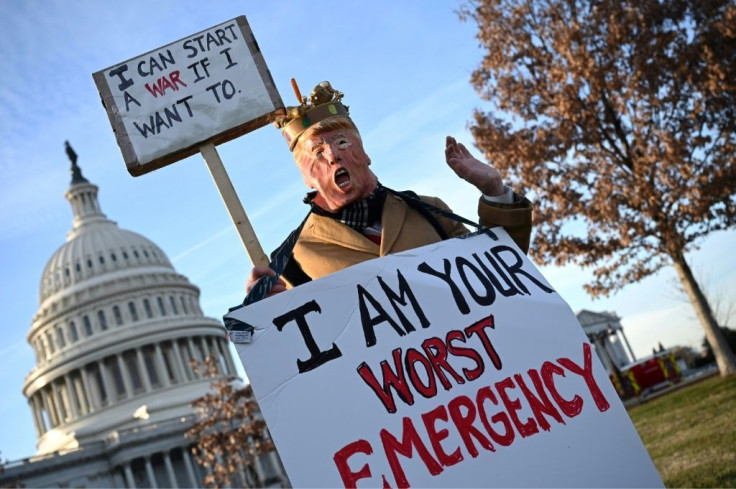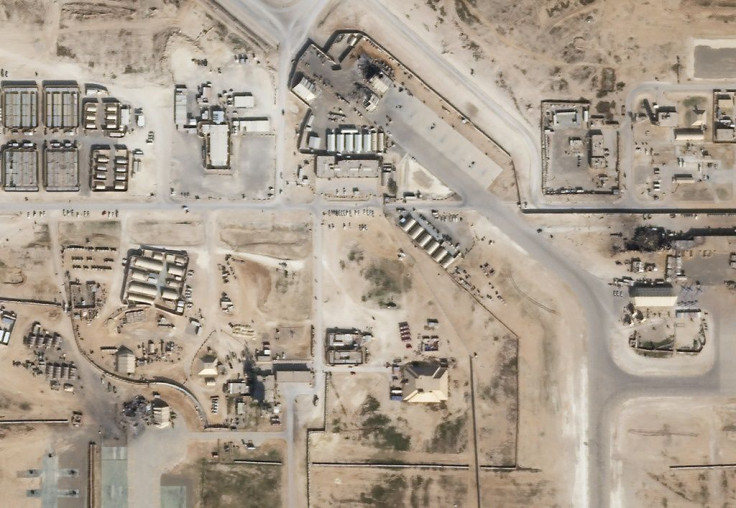Trump Seeks Support In Iran Crisis But Europe Skeptical

With tensions soaring after he ordered the killing of a top Iranian general, US President Donald Trump publicly urged all other powers to abandon a 2015 nuclear accord with Tehran.
Within hours, British Prime Minister Boris Johnson, one of Trump's closest international allies, was on the phone with Iran's president. His message? That, according to Downing Street, the nuclear deal remains "the best arrangement currently available."
The January 3 drone strike that killed Qasem Soleimani, Iran's most powerful general and a longtime US nemesis, has only exacerbated tensions between the United States and Europe in a showdown that has turned into a crisis.
But the episode could paradoxically offer a new chance for the Europeans to attempt what they have sought for three years -- to broker peace between Iran and Trump.
Secretary of State Mike Pompeo, in a startlingly frank statement about allies for the top US diplomat, told Fox News after Soleimani's killing that Europeans "haven't been as helpful as I wish that they could be."
Trump and Pompeo were infuriated by pro-Iranian Iraqi militias' vandalism of the US embassy in Baghdad and rocket fire on bases housing US troops. They said Soleimani was planning imminent attacks on Americans -- a finding disputed by Democratic lawmakers after a classified briefing.
Tensions have steadily mounted since Trump in May 2018 withdrew from the denuclearization accord brokered by his predecessor Barack Obama and instead launched a sweeping campaign to cripple Iran, including seeking to bar all its oil exports.

Rachel Rizzo, an expert on trans-Atlantic security at the Center for a New American Security, doubted Europeans would suddenly change course on the nuclear deal after seeing the flare-up in violence, which included Iranian reprisals on Iraqi bases home to US troops.
"It's pretty unfathomable to me that European allies are going to jump and follow Trump into this abyss that he seems to be sending us in," Rizzo said.
With the goals of Washington and the Europeans sharply at odds, "I think there is going to be increased tension between the two sides and it's going to get worse before it gets better," she said.

Trump called for NATO to take a greater role, later even coining the mission "NATOME," a neologism for NATO and the Middle East that he called "beautiful."
Trump has repeatedly questioned the value of NATO, using the Western alliance's 70th anniversary last month to press for greater funding by Europeans whom he has cast as freeloaders.

Julie Smith, an expert at the German Marshall Fund of the United States and former advisor to vice president Joe Biden, said it was unclear what Trump wanted -- with no one envisioning an Afghanistan-style NATO deployment of tens of thousands of troops.
The Europeans likely "appreciate the irony of a president who has repeatedly criticized the NATO alliance and individual NATO allies and then turns to them in a crisis," Smith said.
But Smith said the Europeans also saw no reason to antagonize the United States, pointing out that they did not criticize the US strike or mourn Soleimani -- the head of the powerful Revolutionary Guards' Qods unit that has backed Shiite paramilitary groups across the Middle East.
"I think the Europeans feel like they're stuck between a rock and a hard place," she said.
France and Germany have also tried to engage Iran as has close US ally Japan, which welcomed President Hassan Rouhani for a visit days before the US strike on Soleimani.
Benjamin Haddad, a French analyst who heads the Future Europe Initiative at the Washington-based Atlantic Council, said that the prospects for diplomacy were higher now than in September, when French President Emmanuel Macron unsuccessfully tried to broker talks between Rouhani and Trump at the United Nations.
Iran has described its reprisal, which did not kill any Americans, as proportional, and Trump viewed it as a sign of de-escalation.
In a rare statement for an administration fiercely opposed to Iran, Trump also acknowledged the Shiite clerical regime's role in fighting the Islamic State group -- a campaign that Europeans consider the top priority in the Middle East.
Trump's speech "opens a small diplomatic window over the common interest with Iran against Daesh," Haddad said, using an acronym for the extremist group also known as ISIS.
"There may not be a more than 50 percent chance of success, but I have the impression that paradoxically there is a larger, more interesting opening than in September," he said.
Smith, however, saw the Europeans' chances as "pretty low" considering the deep gaps between Washington and Tehran, and European leaders' preoccupation with domestic problems.
"The Europeans want to believe that they can play a strong diplomatic role right now. But whether or not they seize the day, and whether there's a real window to do that despite the current climate, is an open question," she said.
© Copyright AFP 2024. All rights reserved.





















